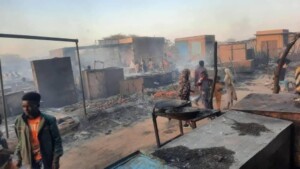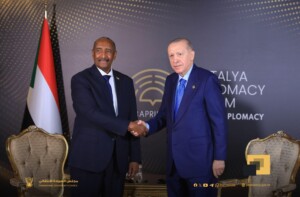North Darfur violence: Rebels ambushed, high-level delegation arrives in El Fasher
A fact-finding committee, headed by Sovereignty Council member Mohamed El Taayshi, arrived in the North Darfur capital of El Fasher on Saturday, to investigate the recent violence south of the city. On Friday morning, a force of former rebel combatants was ambushed in the area.
 A high-level committee from Khartoum arrives in El Fasher to investigate the recent violence in North Darfur (SUNA)
A high-level committee from Khartoum arrives in El Fasher to investigate the recent violence in North Darfur (SUNA)
A fact-finding committee, headed by Sovereignty Council member Mohamed El Taayshi, arrived in the North Darfur capital of El Fasher on Saturday, to investigate the recent violence south of the city. On Friday morning, a force of former rebel combatants was ambushed in the area.
The committee consisted of representatives of the Attorney General, the Sudan Armed Forces, the Rapid Support Forces (RSF*), the Sudanese Police Forces, the General Intelligence Service, as well as the rebel movements that signed the Juba Peace Agreement with the government in October last year. They travelled to North Darfur to investigate the attacks on villages in the southern part of the state last week and the ambush of members of a joint government force in the area on Friday.
On July 30, groups of militants began to attack villages in the areas south of El Fasher. They torched houses and robbed the people of their belongings, including livestock. In the following days, more villages were attacked. At least three farmers were killed. Four children died during their flight. An unknown number of people were injured.
The North Darfur authorities said that the violence was triggered by tribal disputes over the use of agricultural land. During the current agricultural season, displaced people from the Zamzam camp south of El Fasher, temporarily returned to the area to tend their farms.
On Friday, a force of former rebel fighters was ambushed by unidentified gunmen when it was on its way to the area of Kolgi, west of the state capital, to contain the situation. Seven combatants were reportedly killed and 17 others were injured. They were transferred to the El Fasher Military Hospital. Four of them were later flown to Khartoum for specialised treatment.
The North Darfur state Security Committee denounced the attack in a press statement the next day. The committee explained that it had formed a joint force made up of army soldiers, RSF militiamen, Central Reserve Forces (Abu Teira), policemen, and former rebel combatants “to secure the agricultural season, provide security and protect the citizens” in the region.
The force consisted of 100 combat vehicles, including 28 vehicles from the rebel movements. Most of the forces moved to Tabit, where they would be stationed to monitor the area. “The forces of the peace signatories lagged behind because they were not ready yet.” On Friday morning, the delayed group went to join the rest of the joint force but was attacked on the way.
That evening, Vice-President of the Sovereignty Council and RSF Commander Gen. Mohamed Dagalo ‘Hemeti’ held an emergency meeting with Minni Minawi, head of a Sudan Liberation Movement faction and upcoming Darfur Governor, Jibril Ibrahim, leader of the Justice and Equality Movement (JEM) and Minister of Finance, Sovereignty Council members El Hadi Idris and El Taher Hajar, and other former rebel leaders from Darfur. They decided to immediately send a fact-finding committee.
The committee travelled to El Fasher the next morning. After a meeting at the North Darfur government secretariat, the members visited the site of regular forces in the state capital, the office of the “peace partners” (former rebel movements) and the state’s security committee. They were accompanied by North Darfur Governor Nimir Abdelrahman.
The delegation further paid a visit to the wounded rebel fighters in the El Fasher Military Hospital and to the affected area before engaging in a closed meeting on Sunday morning.
In a press statement on Sunday, RSF Deputy Commander and Committee member Lt Gen Abdelrahim Hamdan Dagalo, denounced “the unfortunate events” in the area and stressed the need to restore the Rule of Law.
Governor Abdelrahman, who is also head of the North Darfur Security Committee, said that the areas of Kolgi and Gallab have been declared “emergency areas”. Gatherings and movement are only allowed after permission has been granted. The security committee as well decided to form a joint force of 45 vehicles to assist the forces already dispatched to the area.
A separate committee, headed by a public prosecutor, will investigate the violent incidents.
‘Targeted’
According to the Justice and Equality Movement (JEM), signatory to the Juba Peace Agreement, the recent violence is “a coordinated operation and not an isolated incident [..] targeting the peace process”.
In a statement on Saturday, the movement condemned “the treacherous operation by armed militiamen that targeted a joint force (of the parties to the peace process, the army, RSF, police and security) on Friday when it was on its way to the Gallab area, west of El Fasher”.
It urged the authorities to conduct “a rapid and transparent investigation to uncover the causes of the incidents, find all those who stand behind this traitorous operation, and bring the perpetrators to trial”.
JEM leader Ibrahim expressed in a post on Twitter his sadness about the death of young soldiers during the ambush “set up for forces on their way to Kolgi to secure the area”.
On social media, widely circulated video clips show vehicles and weapons seized by militant tribesmen from “the parties to the peace process” (former rebel combatants) in the Kolgi area.
* Officially, the paramilitary Rapid Support Forces (RSF), set up by the ousted Al Bashir regime in 2013, was integrated into the Sudan Armed Forces (SAF) in August 2019. At the same time however, the militia stays a force unto intself, commanded by Mohamed Hamdan ‘Hemeti’, deputy president of Sudan’s Sovereign Council.
Sources: Dabanga Sudan, Sudan News Agency, Darfur24











 and then
and then